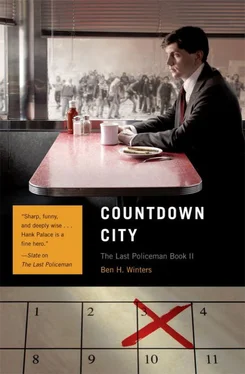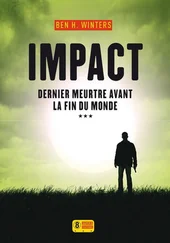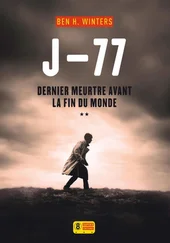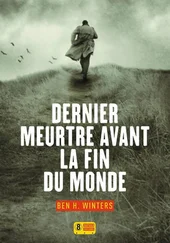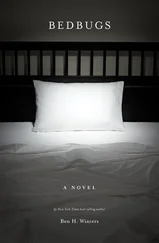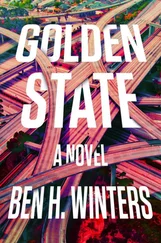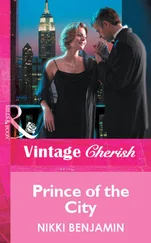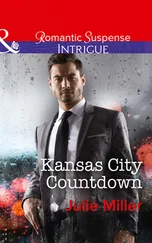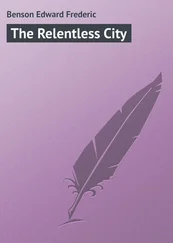“You doing okay?”
“Yeah, dude. You?”
“Yeah.”
One time the headlights of a bus appear in the darkness like lanternfish, get close, zoom past. A mercy bus, running on some sort of rotgut fuel, jammed with singing clapping passengers, luggage racks strapped precariously to the top: off to do some good works somewhere in Jesus’s name. We watch the taillights disappear into the westbound distance, the once-familiar sight of bus headlights on a highway at night as unfamiliar and eerie as if a tank had just rolled by.
I’ve haven’t been to UNH, not recently. I’ve been before, in the old days, but not since Maia, and not since the bloodless “revolution” in January, when a group of students exiled the faculty and staff, took over the campus and rechristened it the Free Republic of New Hampshire. Supposedly the plan was to quickly forge a utopian society in which willing participants can live out the rest of time in communal harmony with their brothers and sisters, everyone contributing, everyone respecting everyone else’s freedom to spend life’s remaining hours doing what they saw fit.
Nico, as I had suspected, has been down there numerous times. Apparently, her little clubhouse in Concord has something of a satellite office in the Free Republic. And, most important, she claims to know exactly how to get me in. “Oh, yeah,” Nico said, grinning, when I explained my dilemma, delighted to be in possession of something I need. “I know the place. I know it well. All the signs and shibboleths.” And when I explained who the client was, that the man I was looking for was married to Martha Milano, that only sweetened the deal—Nico was happy to pack a bag and come help me navigate the terrain.
There was just one condition—and she said that, of course, narrowed her eyes like a gangster-movie tough guy and said, “There’s just one condition…” After the trip, when I had what I needed, I had to promise that I would sit down with her so she could explain what she and her friends are up to.
“You bet,” I told her. We were sitting in Next Time Around on two filthy beanbag chairs, speaking in low whispers. “No problem.”
“I’m serious, Hen.”
“What?”
“You have a way of saying you’re going to listen to something, but then when the other person is talking you’re up in your head having some sort of complicated policeman dialog with yourself about something else.”
“That’s not true.”
“Just promise that when we sit down, and I lay it all out for you, you will listen with an open mind.”
“I promise, Nic,” is what I told her, extracting myself with difficulty from the beanbag chair. Then I even looked her in the eye, to make sure she knew I was listening to her and not to any voices in my head. “I promise.”
And so now we’re biking along 202, through the forested counties, past Northwood Center and Northwood Ridge, talking sometimes, singing sometimes, sometimes just gliding in silence, listening to the distant thud and whack of trees being cut down for firewood. It was harder for Nico than it was for me, everything that happened, the series of catastrophic events that marked our childhood. I was twelve and she was six when our mother was murdered in a Market Basket parking lot, and our father hung himself with a window cord, and we were sent to live with our stern and disinterested grandfather.
It would be difficult for me to disentangle these three sequential and overlapping traumas, tease them apart and judge which affected me the most. I can say with confidence, however, that as painful as all of it was for me, it swept over my sister like an advancing wall of water—pulled her under and never let her up. At six she was a small flickering gem of a child: agile minded, anxious, curious, quick witted, chameleonic. And here comes this great thundering wave and it knocked her over and dragged her around, filled her with pain like water in the lungs of a drowning man.
Somewhere east of Epsom, Nico begins to sing, something I immediately recognize as a Dylan song, except I can’t place it, which is odd to consider, that she might know one I don’t. But then Nico gets to the chorus, and I realize it’s “One Headlight,” the number by Dylan’s son.
“Love that song,” I say. “Are you singing that because of Martha?”
“What?”
I veer in close, pedal up alongside Nico. “You don’t remember? That spring, she listened to that song nonstop.”
“She did? Was she even around?”
“Are you kidding? All the time. She made dinner every night.”
Nico looks over, shrugs. Invariably we refer to that grim doom-heavy period of our mutual memory as that spring , rather than by the more cumbersome formulation that would be more accurate: “the five months after Mom’s terrible death but before Dad’s.”
“Do you seriously not remember that?”
“Why do you care?”
“I don’t.”
She gives herself a burst of speed, takes the lead again, and goes back to singing. “Me and Cinderella, we put it all together…” Houdini is in the wagon hitched to the bike, among the supplies, panting, joyful, his weird little pink tongue tasting the wind.
* * *
It’s past midnight when we get to India Garden, the terrible restaurant just off campus that was, for some reason, Nathanael Palace’s dining selection when I was a high school junior and we came to tour the campus. Dim multicolored lighting, indifferent employees; abundant portions of barely edible food, strangely textured and overly spiced. I had zero interest in attending the University of New Hampshire anyway. You only needed sixty credit hours for the Concord PD, so that’s what I did: sixty hours exactly at the New Hampshire Technological Institute and then off to the Police Academy. I figured Grandfather would be proud eventually, once I was on the force, but by the time I graduated he was dead.
Nico and I kickstand our bikes and wander through the abandoned restaurant like visitors from a foreign planet. The sign’s been torn down and the windows and door smashed with a blunt object, but the inside is untouched, preserved as if for a museum display. Long rows of chafing dishes under long-cold heating lamps, rectangular tables tottering unevenly. The smell, too, is the same: turmeric and cumin and the faint resonance of mop water from the linoleum floor. The cash register, miraculously, has money in it, four limp twenty-dollar bills. I feel them between my thumb and forefinger. Worthless bits of paper; ancient history.
Houdini has fallen asleep in the wagon, nestled amongst my jugs of water and peanut butter sandwiches and Clif Bars and first aid supplies, eyes fluttering, breathing softly, like a child. I lift him out and place him gently in a bed of empty rice sacks. Nico and I roll out sleeping bags and arrange ourselves on the floor.
“Hey, what’s she paying you for this gig?” she asks.
“What?” I say, pulling the little Ruger from my pants pocket and placing it beside my bedroll.
“Martha Milano. What’s she paying you to find her deadbeat husband?”
“Oh, I don’t know. Nothing really. I just…” I shrug, feeling myself get flush. “He promised her he would stay till the end. She’s upset.”
“You’re a moron,” says Nico, and it’s dark but I can hear in her voice that she’s smiling.
“I know. Goodnight, Nic.”
“Goodnight, Hen.”
* * *
The flag of the state of New Hampshire has been removed from above Thompson Hall, and a new flag has been raised in its place. It depicts a stylized asteroid, steel gray and gleaming as it streaks through the sky, with a long sparkling contrail flashing out behind it like a superhero’s cape. This asteroid is about to smash not into the earth, however, but into a clenched fist. The flag is enormous, painted on a bed sheet, rippling buoyantly on the summer wind.
Читать дальше
